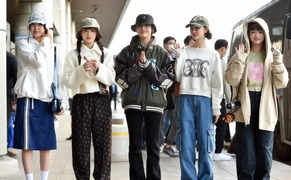 |
| Koo Yoon-cheol, deputy prime minister and minister of economy and finance, delivers opening remarks during a joint meeting of the Growth Strategy Task Force and the Economic Ministers’ Meeting at Government Complex Seoul on Oct. 20. / Source: Ministry of Economy and Finance |
Deputy Prime Minister and Finance Minister Koo Yoon-cheol said on Oct. 20 that “the Korean economy is slowly regaining vitality after a prolonged slump,” vowing to “continue to spread the hard-won recovery momentum.”
Koo made the remarks while presiding over a joint meeting of the Growth Strategy Task Force and the Economic Ministers’ Meeting at Government Complex Seoul.
He said consumption is rebounding “helped by policy effects such as livelihood-recovery coupons,” adding that September employment posted the biggest increase in 19 months and that stock prices “have hit record highs since the launch of the new administration.”
He added the government will stage the “Korea Grand Festival” from Oct. 29 to Nov. 9 to spark a nationwide consumption boom, while redoubling efforts to stabilize the real-estate market and invigorate capital markets so that idle funds flow into productive sectors.
Koo also pledged to “concentrate national capabilities—public and private, with companies at the center—to achieve the ultra-innovation economy and the AI transition as quickly as possible,” and to swiftly announce measures to ease operational strains and restore competitiveness in key industries such as steel and petrochemicals.
Monday’s meeting discussed detailed implementation plans for five of the 15 flagship projects under the ultra-innovation economy agenda: smart agriculture, smart fisheries, ultra-high-resolution satellites, AI-bio, and K-beauty.
The government plans to designate leading innovation zones for smart agriculture and fisheries by 2026 and raise the adoption rate of smart agriculture from 16% to 35% and smart fisheries from 2.7% to 10% by 2030. In satellites, it aims to secure core technology for 10-centimeter-class optical satellites and create an additional 200 billion-won space-dedicated fund, investing more than 100 billion won in promising SMEs and startups.
In AI-bio, the government will build an industry-academia-research-hospital collaboration system to discover at least four drug candidates by 2030, designate regulatory free zones for medical-data use, and expand AI-based automated labs and high-performance computing infrastructure. For K-beauty, it will create clusters that combine experience, culture, and tourism, and select hub regions early next year based on local government demand.
Koo said barriers to the AI transition will also be actively removed. “Through the National Growth Fund (150 trillion won) and the Mother Fund (570 billion won), we will proactively support the early-stage financing needs of AI companies,” he said, adding that the government will “quickly overhaul regulations to enable the use of original data for AI robots and vehicles, and establish safety and certification standards.”
Most Read
-
1
-
2
-
3
-
4
-
5
-
6
-
7





















